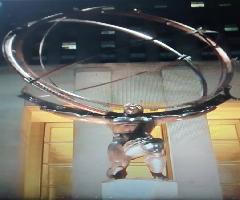On Thursday night, April 12th, at the Fox Lane High School auditorium, the Bedford 2020 coalition and the Westchester Land Trust presented - Water, You are what you Drink. Aimed at linking the Bedford watershed system to human health, the audience was seated by watershed zones to highlight the obligation each
person has in maintaining the present and future quality of the water we drink.
"When water falls to the earth it follows the slope of the landscape to the watershed so what you do matters to your neighbors, said Candace Schafer, Executive Director of the Land Trust.
Ceding the floor
Board certified in nephrology, equating the water we drink to her occupation was something that did not occur to her over night. When it finally did the analogy was clear. "If your kidneys cannot filter out contaminates, they end up in your blood," she said.
The same goes for our watersheds and it's still our health that feels the side effects - especially when it comes to children. "Contaminates are leading to increases in obesity, diabetes, ADHD and autism," said the leader of the coalition's Water and Land Use Task Force.
The latter two are now strongly linked to a new class of chemicals that disrupt the endocrine system. Effecting brain development, the detriments are not necessarily linked to quantity but to timing in
which they invade the body. "The amounts that cause problems are so small but if they occur in the womb or at an early age, the effects are more pronounced," she said.
Also included among the problem of Endocrine disruption is something called male feminization. Decreased sperm count, undescended testes and the aforementioned stunted brain development are associated with the condition. In 2009, she said, the Endocrine Society was able to reproduce the effects in the lab and has found the problem in both fish and humans.
This is where the health of our water can be likened - of sorts - to the weakest link in the neighborhood chain. Superfunds and government regulation exist to combat industrial waste but there is very little control on the products we buy and then dump down our drains. In turn, she recommends finding eco-friendly detergents and executing sustainable gardening and lawn care practices.
Of course, leading by example doesn't necessarily get the results a water conscious resident wants out of his or her neighbor. In response, Dr. Lewis' intent was not to end the conversation with the evening's activism. "We're hoping
you will work with us so we can educate your neighbors," she said.Bedford 2020 also makes itself available to speak to groups but purchasing sustainable products has an important effect beyond the results that emerge from backyard actions. Demonstrating buying power, she said, "That's the beginning of impacting water quality through legislation.
In the interim, she recommends the informed purchase of a water filter. "First get your water tested so your filter is specific to the contaminates in your water," she said.
But back in the ecosystem, roads like 684 do their share of the damage. "Oil slicks, deicing salt and random gravel are all picked up as runoff and land back in the watershed," she said.
The best counter to pavement and development gave way to the second speaker. "Forests are the kidneys of our water supply," reiterated Brendan Murphy of the Watershed Agricultural Council.
Aside from the said development, the main threat to forests is the incidence of natural disturbance like heavy storms or disease. Even so, forests may contain too many trees of the same age and natural progression inevitably leads to a significant gap in the tree line.
On the other end, too dense a forest means a weaker wooding with competition for limited natural resources. Additionally, a dearth of invasive vine species can choke off the growth of younger trees, as can be now seen on many of our parkways.
In turn, a lack of adequate re-growing conditions paves the way for weaker forests and poor water quality. He recommends people stay connected to the Land Trust in order that their towns effectively manage their open space.
Otherwise, people can get their hands dirty to keep their water clean by simply planting a tree or getting involved in vine eradication with environmental groups. Either way, it all starts and ends in the same place.
"Too maintain our water systems and forestry it takes a collective effort," he concluded.
Contact Bedford 2020 for their brochure on sustainable lawn care. Additionally, One of their Task Force Members, Mimi Lines, is a professional landscape designer and past president of Bedford Garden Club. She is available for information.


